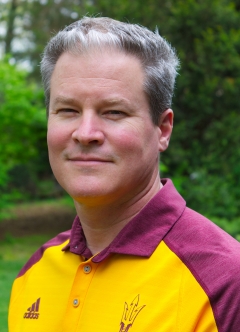Arizona State University's Pat Tillman Veterans Center has found its next leader.
Col. Jeffrey A. Guimarin, who has spent most of his 25-year Air Force career in cybersecurity, will take on the director role starting June 1.
It’ll be a new direction for the Tillman Center, as well as for the man occupying the top position.
“I have a cyber background and could have turned right around and found a job as a contractor or a federal employee and walked right back into the buildings and organizations that I’ve been in for years,” said Guimarin, who is about to retire from his post at United States Cyber Command, located at Fort Meade, Maryland. “I wanted to break from that mold and do something personally meaningful, which is advocating for veterans and being a part of the ASU experience.”
The center provides a single point of contact for ASU veterans and their dependents, connecting them with academic and student support services to promote a smooth transition from the military, as well as assistance for veterans benefits, employment and referrals. It's also a place where veterans can gather for study groups and social activities. The university has approximately 9,200 military-affiliated students.

Jeff Guimarinf
Following in the footsteps of Steven Borden, who came to ASU in 2010 as the founding director, Guimarin is the center’s second director. He was selected after a six-month search, according to ASU’s Kent Hopkins.
“Col. Jeff Guimarin will lend a wealth of experience to the university and the division of Enrollment Services in this position,” said Hopkins, vice president of enrollment services in the Office of the University Provost. “He also has a proven track record of successful leadership over a 25-year Air Force career. Along with his military background, with his upcoming retirement from active duty, Col. Guimarin also brings firsthand knowledge of the veteran experience.”
Guimarin has past ties to ASU. From 2016–17 he served as chair of the Aerospace Studies Department, as well as commander of the Air Force ROTC detachment on the Tempe campus. The job required him to work closely with the Tillman Center, which left an impression on him.
“In all the interactions, I was always impressed with the center’s commitment to helping veterans achieve their goals,” Guimarin said. “I was also motivated by what the student veterans offered back to the university, as several of them were cadets in my program.”
It was a memorable experience, according to Guimarin, who didn’t want to leave the Valley of the Sun. However, he took the position at U.S. Cyber Command, where he directed a 32-member team in building efforts to enhance domestic and international collaboration in support of global cyberspace operations. When the center's director job opened up, Guimarin said he practically “jumped at it.”
“There was about a week or two, back in 2017, while I was here at ROTC, that my wife and I talked about me declining a promotion to colonel and not going to Maryland because we really liked it at ASU — the whole environment, the culture, the lifestyle,” Guimarin said. “But, I was looking forward to having an impact on some larger strategic issues in the cyberspace domain, so we left. But, when we got to Maryland, I kept saying, ‘I can’t wait to go back to Arizona.’ There’s always been a pull and gravity for me to get back there.”
Guimarin said he doesn’t want to reinvent the wheel in his new position, but rather focus on the core business of the Tillman Center and make it as efficient as possible. That includes making sure veterans know and understand their entitlements, ensuring efficiency of processes, focusing on outreach and engagement and developing strong partnerships with potential sponsors and veterans service organizations.
“The new partnership with the Arizona/365 Community Union will help foster a lot of veterans activities and also push better understanding by civilians of the military and veterans,” said Guimarin of the initiative that will transform Sun Devil Stadium from a football field into a university asset that’s utilized 365 days of the year. “We want to educate others about veterans, the mission of the center and narrow that civil-military gap as much as possible.”
Guimarin is also hopeful that he can get other use from the gridiron — he’s a high school football official in his spare time. He hopes that after he gets a feel for his new duties, he can start officiating again on Friday nights around the Phoenix metro area.
“I’ve been doing it for the last 15 years and it would be strange not to be out on the field during football season,” Guimarin said. “I very much want to be a part of that because, like the military, it’s in my blood.
"The family and I can’t wait to head out west. We’re looking forward to Arizona being our home for a long time.”
Top photo by Charlie Leight/ASU Now
More University news

From service to civilian success
Transitioning from military to civilian life is a unique experience that can be challenging for veterans. Some struggle to find their purpose, while others seek a network of people and resources to…

ASU as the 'New American University' sets the model for higher education reform
Arizona State University’s charter is only 46 words long, but it’s a bold promise that’s a model for the reinvention of higher education.The document, formally introduced by ASU President Michael…

School of Molecular Sciences faculty member honored for contributions to photochemical sciences
Regents Professor Ana Moore, acclaimed faculty member of the Arizona State University School of Molecular Sciences, has been named the 2025 recipient of the prestigious George S. Hammond Award from…
